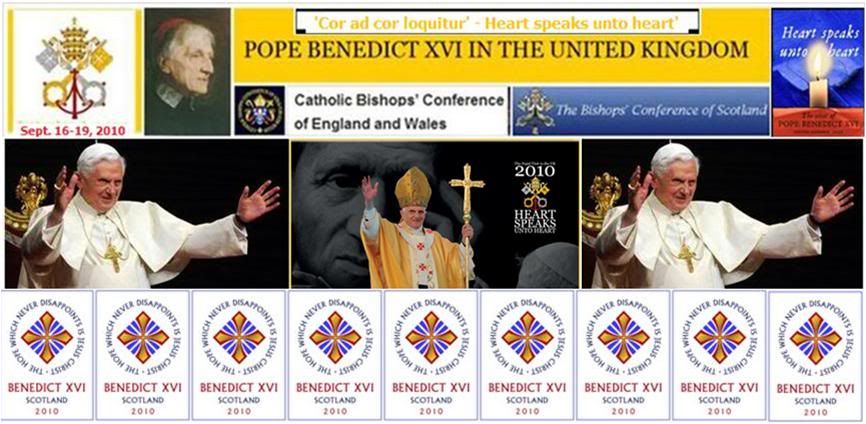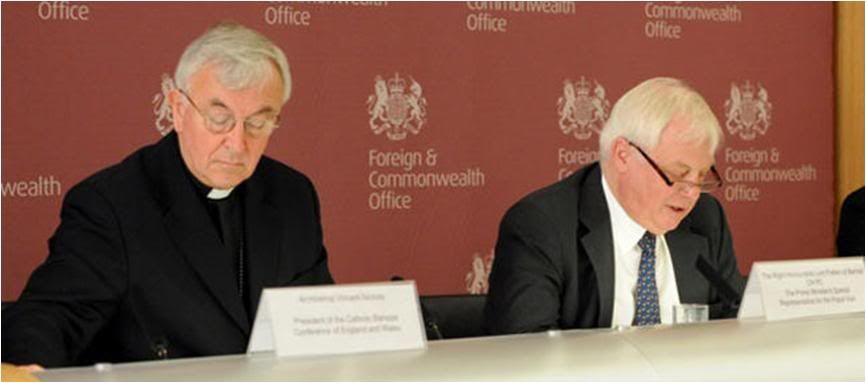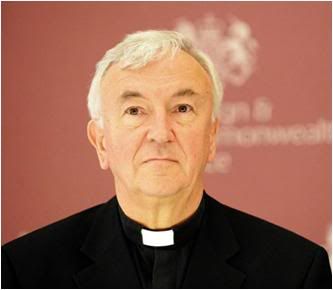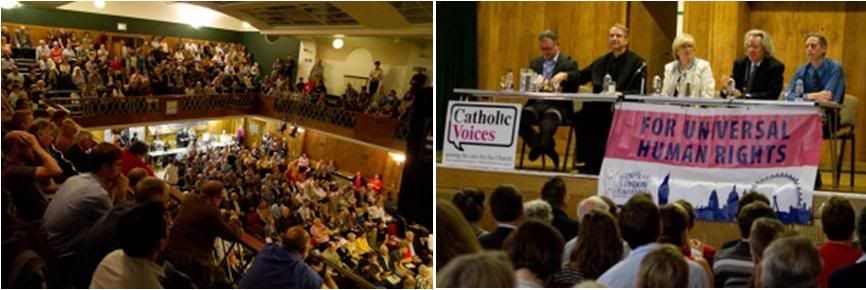 The UK-based PROTECT THE POPE site claims that the 'international' news conference on which this story was based was not open to the UK press - a questionable decision at the very least, and perhaps even stupid, in view of the media situation vis-a-vis the Catholic Church and the Pope in the UK media. And that is why PROTECT THE POPE itself can only cite the ZENIT story below. The news is not even on the official papal visit site yet!
Mons. Nichols says all is set for the papal visit;
The UK-based PROTECT THE POPE site claims that the 'international' news conference on which this story was based was not open to the UK press - a questionable decision at the very least, and perhaps even stupid, in view of the media situation vis-a-vis the Catholic Church and the Pope in the UK media. And that is why PROTECT THE POPE itself can only cite the ZENIT story below. The news is not even on the official papal visit site yet!
Mons. Nichols says all is set for the papal visit;
government rep says it will be a huge success

LONDON, SEPT. 1, 2010 (Zenit.org).- With just over two weeks before Benedict XVI sets foot in the United Kingdom, the archbishop of Westminster says that "things are in place now" and the visit will unfold in a "very excellent way."
 Nichols and Patten at their first joint news conference last June.
Nichols and Patten at their first joint news conference last June.
Archbishop Vincent Nichols made this affirmation at a press conference Tuesday with Lord Chris Patten, the prime minister's representative since June for overseeing the papal visit.
Patten began the comments by saying Benedict XVI's visit "deserves the word 'historic.'" He affirmed that "the new coalition government is delighted that the Pope accepted [the queen's] invitation, and regards his visit here later this month as an extremely special moment for all of us, whether Christians, Catholics, or not."
There are various reasons for the anticipation, the government official affirmed. First, the Pope represents 10% of the country's citizens, and more than 1 billion people worldwide. And the British government and the Church work closely together toward "social equity and sustainable development," Patten said. "We don't share every policy position but we work extremely closely with the Church in Africa, in Asia, in the United Nations."
The Church also makes an "important contribution," Patten continued, "to the social development of our society, and in particular to education. [...] So for all those reasons the Pope's visit is hugely welcome. But it’s also welcome I think because of its assertion of the important role that religion, that Christianity, has played in the shaping of our own society. I think people will be listening to what His Holiness has to say about the relationship between religion and some of the other presently dominant influences in our society and in Europe as a whole."
Patten reflected on the role of Cardinal John Henry Newman, who will be beatified by the Pope on the last day of the visit.
He said, "Cardinal Newman was described at the time of his death by the Manchester Guardian, as it then was, as the greatest Englishman and certainly the greatest writer of the English language."
Patten summarized the visit as giving the Holy Father a chance to meet "representatives of civil society, other faith groups, political leaders, and of course Christians and Catholics. The arrangements have been taken forward very well. [...] I think that everything is in place for what I hope will be a visit which will of course be seen not only by people in this country, but by hundreds of millions around the world."
"We would expect a huge amount of global attention for his visit here," he continued. "So I think this visit will be hugely interesting, hugely successful, and the one thing we can't hand-on-heart guarantee is the weather, but we hope it will be more like Rome than Oslo."
Archbishop Nichols gave perspectives from the Catholic community, saying that "we look forward to it with great confidence and ease. We know that things are in place now and that this visit will unfold in a very excellent way."
He reflected on differences between this papal visit, and Pope John Paul II's 1982 U.K. trip.
"[John Paul II's visit] was in response to an invitation extended by the Catholic community, and in a way the rest of society in Britain watched. They watched with interest, they watched with some curiosity, but nevertheless it was quite a spectacle, but it was a Catholic spectacle," the archbishop said.
"This is different because now the Pope has been invited to address U.K. society. Clearly there is a strong Catholic component to the events but nevertheless in response to the invitation he will address the society of our country at this crucial time. So we look forward to it very, very much indeed."
Archbishop Nichols reflected on three levels to the trip: its aspect as a meeting between the United Kingdom and the Holy See, the "profound historic and cultural implications and ramifications for the visit" and the perspective of "the role of faith in society at a personal and community level."
Regarding the second point, the prelate noted: "The image of Her Majesty the Queen welcoming Pope Benedict and formally greeting each other is one that will resonate through the story of this land. When the Pope enters Westminster Hall on the Friday evening to address politicians, diplomats, leaders of this society, that will be another very historic and resonant moment. The Pope will pause at the spot at which St. Thomas More, the Lord Chancellor of England, was condemned to death in 1535 for his Catholic faith. He will be on that spot. He will also, with the Archbishop of Canterbury, go to pray at the tomb of St. Edward the confessor, the canonized King of England, the founder of Westminster Abbey.
"And that too will enable us, as it were, to reach back into the deeper roots of who this nation is, who we are, and what our cultural roots are, and how refreshing they can be when they are seen to be a living source of inspiration for people today. And I think the fact that the Pope will also meet with leaders of society, who are men and women of all the different faiths present in this country, will also be a moment in which the Pope affirms the role of the breadth of faith in God as found here as a contributor to the common good."
Finally, Archbishop Nichols reflected on the beatification of Cardinal Newman, noting that the theme of the trip was the cardinal's motto: "heart speaks unto heart."
"Because," the archbishop explained, "he said it’s through the imagination, it is through the metaphors, it is through the language of the heart, that the things of God most come through to us. Rather than through the logic of argument or eloquent discourse."
Belatedly posted by the official website, but nonetheless worth reading, are the full remarks given by Lord Patten and Mons. Nichols at the news conference desfribed above:
Transcript of Nichols/Patten remarks
at 8/31/10 news conference

8/31/2010
Welcome to our weekly update on Pope Benedict's visit to the UK. In a change to the normal format, this week Lord Patten and Archbishop Vincent Nichols speak at a press conference held at the Foreign and Commonwealth Office on 31 August.
Lord Patten:

Can I just say myself at the outset that I think this visit deserves the word ‘historic’ given the island story of this archipelago. The first state visit of a Pope to the United Kingdom is a moment of very great significance, and I say that not only as one of the 10% of the population who is Catholic, but I think for the whole country.
The last Government invited His Holiness to come to the United Kingdom. The Prime Minister and several ministers conveyed that invitation. The Queen gave a formal invitation earlier this year, the new coalition Government is delighted that the Pope accepted that invitation, and regards his visit here later this month as an extremely special moment for all of us, whether Christians, Catholics, or not. The reasons I’ll set out very briefly and others will speak to them.
First of all, we are welcoming the head of a Church which represents about 10% of citizens of this country, and represents over a billion people around the world.
Secondly, we're welcoming somebody with whose Church we work closely around the world in pursuit of the Government's aims of promoting social equity and sustainable development. We don't share every policy position but we work extremely closely with the Church in Africa, in Asia, in the United Nations, for example, in about three weeks time in promoting the same goals in New York when the Millennium Development Goals are discussed, and I hope when the issue of climate change is debated once again later this year. We also work very closely with faith groups, and in particular the Catholic Church, in trying to develop social solidarity in our community.
The Catholic Church of course makes an important contribution to the social development of our society, and in particular to education of which, like it or not [What a gratuitously objectionable statement!], I am one of the products.
So for all those reasons the Pope's visit is hugely welcome. But it’s also welcome I think because of its assertion of the important role that religion, that Christianity, has played in the shaping of our own society.
I think people will be listening to what His Holiness has to say about the relationship between religion and some of the other presently dominant influences in our society and in Europe as a whole.
The details of the visit had been made clear I think in press statements from the Vatican. As you know the Pope is beginning his visit in Scotland, Edinburgh, Glasgow. Then coming down to London for events in London, and then going to Birmingham on his last day for the beatification of Cardinal Newman who is another significant reminder of the Catholic heritage, Christian heritage, in this country.
Cardinal Newman was described at the time of his death by the Manchester Guardian, as it then was, as the greatest Englishman and certainly the greatest writer of the English language.
So that's the overall shape of the program which will enable His Holiness to meet representatives of civil society, other faith groups, political leaders, and of course Christians and Catholics.
The arrangements have been taken forward very well by a team of Government departments, local authorities, the police, health services. I think that everything is in place for what I hope will be a visit which will of course be seen not only by people in this country, but by hundreds of millions around the world.
It’s worth remembering that this is not only a great British event but a great European Commonwealth event, 40% of Canadians are Catholic, 25% of Australians, and a great global event. When the Pope went to Sydney for World Youth Day I think more people went to Sydney for that than went to Sydney for the Olympics.
We would expect a huge amount of global attention for his visit here. So I think this visit will be hugely interesting, hugely successful, and the one thing we can't hand-on-heart guarantee is the weather, but we hope it will be more like Rome than Oslo.
Archbishop Vincent Nichols:

Thank you very much Lord Patten. Could I speak just for a few moments from perspectives of the Catholic community in this country, the Bishops’ Conference of England and Wales, and including the perspectives of the Catholic community in Scotland as well.
I think the first point I would like to make is to express very clearly our thanks to Her Majesty’s Government for not simply the invitation extended to the Holy Father, but also for the extraordinary effort and cooperation that they have extended in planning this visit.
That cooperation and the planning has been complex, and it's been difficult and sensitive at times but this is unexplored territory. There has never been a state visit like this before and I would like to emphasise that the effort that has been made, particularly under the leadership of Lord Patten, is quite extraordinary.
And I'm very, very grateful to the Government for that very positive cooperation and leadership that they have offered in cooperation with the Catholic community in getting this visit well organised as it now is. And we look forward to it with great confidence and ease.
We know that things are in place now and that this visit will unfold in a very excellent way.
Clearly the Catholic community looks forward to this immensely. In 1982 when Pope John Paul II came to this country, that was in response to an invitation extended by the Catholic community, and in a way the rest of society in Britain watched. They watched with interest, they watched with some curiosity, but nevertheless it was quite a spectacle, but it was a Catholic spectacle.
This is different because now the Pope has been invited to address UK society. Clearly there is a strong Catholic component to the events but nevertheless in response to the invitation he will address the society of our country at this crucial time. So we look forward to it very, very much indeed.
I think in my mind, reflecting quite a lot of what Lord Patten has just said, there are three dimensions or three levels at which this visit unfolds and works.
The first is that it is a visit between two international entities, the United Kingdom and the Holy See, so there is a very official structure to this visit. There will be a banquet at which leaders from the different sections of the work of the Church worldwide sit down and discuss with Government officials, as we will hear shortly.
What is fascinating perhaps to remember is that the first ambassador from this country to the Holy See was appointed in 1479, and in fact it was the first overseas ambassador appointed by the Monarch of England was to the Holy See.
So this inter-state, if you like, this relationship, this official diplomatic relationship between the Holy See and the United Kingdom is very, very long. And even though there are long gaps in that relationship it’s very significant.
Secondly I think, from this country's point of view as Lord Patten has already said, there are profound historic and cultural implications and ramifications for the visit. And I suspect that these will be conveyed as much in the images as in some of the speeches and the words.
So the image of Her Majesty The Queen welcoming Pope Benedict and formally greeting each other is one that will resonate through the story of this land.
When the Pope enters Westminster Hall on the Friday evening to address politicians, diplomats, leaders of this society, that will be another very historic and resonant moment. The Pope will pause at the spot at which Saint Thomas More, the Lord Chancellor of England, was condemned to death in 1535 for his Catholic faith. He will be on that spot.
He will also, with the Archbishop of Canterbury, go to pray at the tomb of St Edward the confessor, the canonised King of England, the founder of Westminster Abbey.
And that too will enable us, as it were, to reach back into the deeper roots of who this nation is, who we are, and what our cultural roots are, and how refreshing they can be when they are seen to be a living source of inspiration for people today.
And I think the fact that the Pope will also meet with leaders of society, who are men and women of all the different faiths present in this country, will also be a moment in which the Pope affirms the role of the breadth of faith in God as found here as a contributor to the common good.
And I think the third level at which this visit will work is in terms, as Lord Patten has said, of the role of faith in society at a personal and community level.
We will in the course of the visit be exploring the role of faith and education, the role of the Christian faith and the care of the elderly, the dialogue between faiths, the fundamental search for God in the spirituality of the human person especially in a Vigil of Prayer in Hyde Park on the Saturday evening.
And again there's a little resonance there that the previous Saturday there will have been the great Proms in the Park event where music is the medium by which the spirit of our endeavours of human beings is used.
The following Saturday it will be Prayer in the Park where we, as it were, look at the centre of this great city at the role of how the human person stands before God in prayer.
Then in Westminster Cathedral the theme of exploration will be much more sensitive. It will be to do with compassion, to do with the experience of forgiveness, and what are the sources of forgiveness that are so needed in our society.
And then finally in this role of faith in society there is the figure of Cardinal John Henry Newman, who was above all else an explorer of the experiences of the heart. Which is why, when he was appointed to be a cardinal of the Catholic Church, he chose as his motto the title that we've given to this explanatory booklet ‘heart speaks unto heart’.
Because he said it’s through the imagination, it is through the metaphors, it is through the language of the heart, that the things of God most come through to us. Rather than through the logic of argument or eloquent discourse.
It might be of interest to you that the origin of the phrase ‘heart speaks unto heart’ is in fact from the writings of St Francis de Sales who is the patron saint of journalists, so there's somebody on your side at this point. Lord Patten, thank you very much.
Abbot, nun and journalist
take on a ‘bear pit’ of atheists
to debate the Pope's visit
By Ed West

Thursday, 2 September 2010

An abbot, a nun and a Catholic journalist defended the Church last night in a debate held by the British Humanist Society over whether the Pope should be granted a state visit to Britain.
Journalist Austen Ivereigh, who runs Catholic Voices, a team of young Catholics trained to speak to the media, and Fr Christopher Jamison, former abbot of Worth Abbey, spoke against the motion “The papal visit should not be a state visit”, but were defeated by a hostile crowd.
Human rights activist Peter Tatchell and philosopher A C Grayling spoke for the motion at the event in the humanist South Place Ethical Society building in central London.
The debate, organised by the Protest the Pope campaign, was chaired by
Guardian columnist and prominent humanist Polly Toynbee.
Alan Palmer, chairman of the Central London Humanists, said before the event: “We know that many people are angry that the state visit of Pope Benedict XVI is going to cost the UK taxpayer a lot of money. Some wonder whether in the current economic circumstances we should be spending millions of pounds to provide a state platform for a religious leader who has already criticised our legislation and condemned the way we organise our society.”
But Dr Ivereigh described the debate as “a bear pit”, saying afterwards: “It was very nasty, there was a lot of shouting, a lot of abuse. It was very hard to make our point. But I was glad we were there. Even if people weren’t listening, and they weren’t, it was important that we were there, and we witnessed what the Catholic Church is about.”
Speaking against the papal visit, A C Grayling said the Pope and the Church were being given a platform that was disproportionate to the size of their membership and being paid for by the UK taxpayer. He also said the Catholic Church was a criminal conspiracy, with members committing crimes and those crimes being protected by the hierarchy higher up.
Peter Tatchell said the Pope should not be invited because he opposes women’s ordination, as well as IVF and embryonic stem cell research, and as Cardinal Joseph Ratzinger helped to cover up child sex abuse cases. He also criticised plans to make Pius XII a saint.
Speaking against the motion, Fr Jamison said the Church made huge contributions to civil society through schools, and helped with homelessness and the environment.
Dr Ivereigh, a former spokesman for Cardinal Cormac Murphy-O’Connor, said the Pope was right about Aids in Africa, and that the Catholic Church saved more Jews during the Holocaust than any other organisation.
One Catholic, who writes the Claz Coms blog, said many members of the audience wore “anti-Catholic ‘Pope Nope’ T-shirts” and that “right from the start of the debate, there was a lot of shouting from the humanist supporters… I don’t mean civilised shouts of agreement or disagreement, but actually almost barbaric screams of war!”
She wrote on her blog: “As a Catholic, I want to say how pleased I am with the way Catholics behaved, and voiced their opinions. Of the two sides, the reasons for the Pope’s state visit were by far the most succinctly argued, calmly delivered, and least abusive.”
Another member of the audience, Sister Gemma Simmonds of the Congregation of Jesus, said: “As a woman and a British citizen I frequently object to a variety of heads of state”, but that people around the world had to aspire to get on as best as they could. She urged people to welcome him.
[Modificato da TERESA BENEDETTA 02/09/2010 18:50]